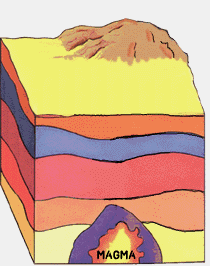
IGNEOUS ROCKS
Igneous rocks are called fire rocks and are formed either underground or above ground. Underground, they are formed when the melted rock, called magma, deep within the earth becomes trapped in small pockets. As these pockets of magma cool slowly underground, the magma becomes igneous rocks.
Igneous rocks are also formed when volcanoes erupt, causing the magma to rise above the earth's surface. When magma appears above the earth, it is called lava. Igneous rocks are formed as the lava cools above ground.
Granite rocks are igneous rocks which were formed by slowly cooling pockets of magma that were trapped beneath the earth's surface. Granite is used for long lasting monuments and for trim and decoration on buildings.
Scoria rocks are igneous rocks which were formed when lava cooled quickly above ground. You can see where little pockets of air had been. Scoria is actually a kind of glass and not a mixture of minerals.
Pumice rocks are igneous rocks which were formed when lava cooled quickly above ground. You can see where little pockets of air had been. This rock is so light, that many pumice rocks will actually float in water. Pumice is actually a kind of glass and not a mixture of minerals. Because this rock is so light, it is used quite often as a decorative landscape stone. Ground to a powder, it is used as an abrasive in polish compounds and in Lava© soap.
Obsidian rocks are igneous rocks that form when lava cools quickly above ground. Obsidian is actually glass and not a mixture of minerals. The edges of this rock are very sharp.
Igneous rocks are called fire rocks and are formed either underground or above ground. Underground, they are formed when the melted rock, called magma, deep within the earth becomes trapped in small pockets. As these pockets of magma cool slowly underground, the magma becomes igneous rocks.
Igneous rocks are also formed when volcanoes erupt, causing the magma to rise above the earth's surface. When magma appears above the earth, it is called lava. Igneous rocks are formed as the lava cools above ground.
Granite rocks are igneous rocks which were formed by slowly cooling pockets of magma that were trapped beneath the earth's surface. Granite is used for long lasting monuments and for trim and decoration on buildings.
Scoria rocks are igneous rocks which were formed when lava cooled quickly above ground. You can see where little pockets of air had been. Scoria is actually a kind of glass and not a mixture of minerals.
Pumice rocks are igneous rocks which were formed when lava cooled quickly above ground. You can see where little pockets of air had been. This rock is so light, that many pumice rocks will actually float in water. Pumice is actually a kind of glass and not a mixture of minerals. Because this rock is so light, it is used quite often as a decorative landscape stone. Ground to a powder, it is used as an abrasive in polish compounds and in Lava© soap.
Obsidian rocks are igneous rocks that form when lava cools quickly above ground. Obsidian is actually glass and not a mixture of minerals. The edges of this rock are very sharp.
No comments:
Post a Comment